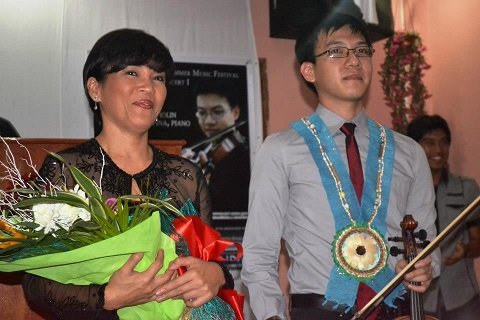
By PABLO A. TARIMAN
THE first time former London-based OFW Esperanza Tresvalles showed up in a Catanduanes concert was in May 1992 when she graced the concert of Manila-based soprano Luz Morete and pianist Najib Ismail in a well-received voice recital in a small venue near the historic Bato Church.
In her summer rag-tag attire and with some wild flowers on her hair, she entered the hall just in time when the soprano was singing Sisa’s aria from Felipe Padilla de Leon’s Noli Me Tangere. Contrary to what people feared, she was well-behaved during the concert. In the post-concert reception in the church convent, the visiting artists noticed Tresvalles spoke perfect British English.
From 1984 to 2011, Tresvalles — who became a modern Sisa in the island after a case of family betrayal compounded by unrequited love — roamed the streets of Virac and Bato towns, lived in church belfries, town squares, by the lake and found short-lived menial jobs in parish convents in exchange for food and accommodation.
In April last year, Esperanza was reunited with her British son, Tarik Khan, after 29 years and finally, her long journey to normal life started. From the way her life unravelled since then, her story is the perfect stuff of prime time telenovelas.
In the opening concert of the 2013 Catanduanes Summer Music Festival last March 16, Tresvalles showed up at the Virac concert venue and became the cynosure of all eyes. It was her second big concert since 1992 and her first since she was reunited with her son.

Tresvalles joined the standing ovation for violinist Christian Tan and pianist Mary Anne Espina along with Rep. Cesar V. Sarmiento who publicly acknowledged the presence of the former OFW. Sarmiento — who delivered the welcome remarks — noted the power of music to unite people from all walks of life and even political figures from rival political camps.
The violin recital was the first in the island after 12 years.
Tan and Espina received a rousing standing ovation after the rendition of “Bayan Ko” and “Sa Kabukiran” and gave the artists another round of ovation after “Sarung Banggi.”
The visiting artists obliged with one more encore – Molina’s “Hatinggabi” – after prolonged applause. “The concert was simply awesome,” said Tarik Khan , the British son of Tresvalles.
An independent province since October 24, 1945, Catanduanes has heard only five violin recitals in its 68 years of existence. Thus far, the violinists heard in the island were Gilopez Kabayao in the 60s, Joseph Esmilla and Donnie Fernandez in the 90s and Romanian violin superstar Alexandru Tomescu who performed in the provincial capitol in April 2000.

Alexander Comoda, a Manila-based piano technician, flew to the island to repair and tune an Yamaha upright piano which has seen better years.
The next festival concert is on April 27 in also at Kemji Resort featuring baritone Noel Azcona, flutist John Raymund Sarreal and pianist Najib Ismail.
With the successful festival opening, a suggestion has cropped that classical music be made a regular attraction in the island to lure more tourists.
The island musicians think that classical music will bring in grade A tourists to the island which can be reached by bus from Manila in 12 hours, an hour by air.
With its new landmarks (Jollibee foodchain, Center Mall, Mercury Drug) and new hotels and resorts sprouting all over the towns, one can see that big commerce has invaded the island with sari-sari stores slowly fading out.
Aside from the quilting and appliqué making, which is now a P5M industry in the island, the new mall – according to Gov. Joseph Cua – can easily double the P3.5 million property tax collection.
Whether music can contribute to the island’s growing per capita income is debatable but it sure can do something about the quality of life among islanders.
In the 60s, the islanders had piano and violin lessons enough to make a living for a violin-maker named Fructuoso Borja whose old violin collections are now housed in Museo de Catanduanes.
By and large, the music festival is the beginning of what islander Ariston “Titong” Sarmiento once called the renaissance of people finally appreciating “the finer things in life.”

